Unless you've been hiding under a bagel all these years, you're aware of the many popular low-carbohydrate diets that have unfairly demonized grains, fruits, and starchy vegetables. You've probably even tried going low-carb for a while. Maybe you're still shunning sweet potatoes because a skinny influencer you follow online warns they'll bump you out of ketosis, god forbid. At the risk of beating a dead Brussels sprout, we'll say it again: Not all high-carb foods will make you fat. It's certain carbs, usually, those that come in a box or snack bag or don't have any fiber left in them, that may be detrimental to your health and waist.
Most dietitians and doctors agree and research backs up the idea that carbohydrate is an essential macronutrient for good health and should not be avoided. For example, Polish researchers using data from the U.S. National Health and Nutrition Examination Survey, warned that long-term low-carb diets lead to unhealthy outcomes in a study presented at the European Society of Cardiology Congress in 2018. The study found that eating less than 215 grams of carbs a day over six years increased the risk of cancer death by 36% and cardiovascular disease death by 50%. (By the way, 215 grams is roughly the amount of carbs in a large apple, 15 crackers, 2 tablespoons of peanut butter, and a glass of vanilla soy milk.)
A 2019 meta-analysis in the journal The Lancet suggests that carbs can be metabolically protective. In reviewing 58 clinical trials, researchers found that adults who ate the most whole grains, vegetables, and other carbohydrates that are high in fiber reduced their risk of diabetes and colorectal cancer by 15–31% and reduced their risk of death from stroke or heart disease compared with people who ate low amounts of healthy carbs.
Here are some doctor- and dietitian-recommended high-carb foods you shouldn't fear, but instead, consider putting on your plate today.
Bread & pasta
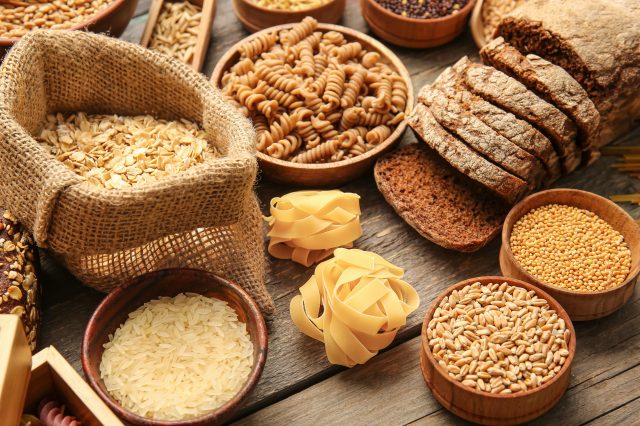
Don't dis all carbs. Even the poster children for high-carb foods, bread and pasta, are important for good nutrition.
"Eliminating all carbs can be counterproductive to your health, leading to significant deficiencies," warns registered dietitian nutritionist Dr. SuNui Escobar, DCN, RDN, a doctor of clinical nutrition and owner of MenopauseBetter.com. "Carbs provide glucose, which is essential for energy production in cells, including the brain. They also contain fiber, vitamins, minerals, and other beneficial phytonutrients."
Just remember to choose bread and pasta made with whole grains, which are slow-digesting complex carbohydrates.
Apples & pears
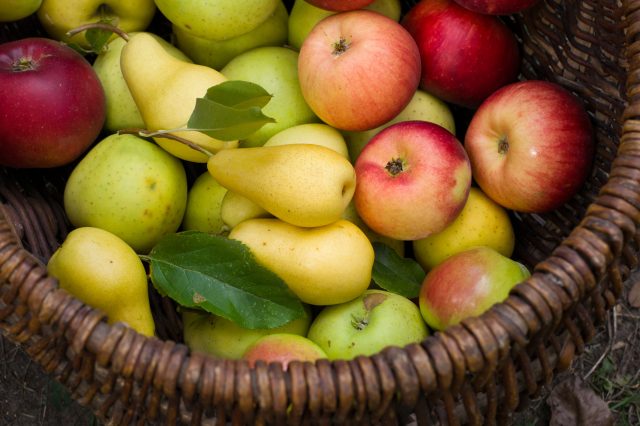
Yes, these fruits are considered to be high-carb foods because of their fructose, or the sugar in fruit. However, their nutrition benefits outnumber the carbs you're getting, especially if you eat the whole fruit, including the skin of apples and pears.
"Whole foods are rich in fiber, often water, and nutrients to slow digestion, help us to feel full longer and decrease sugar cravings," says Amy Shapiro, RD, founder of Real Nutrition NYC.
Medium-sized apples and pears eaten with the skin deliver 4.8 and 5.5 grams of fiber, respectively.
Steel-cut oats
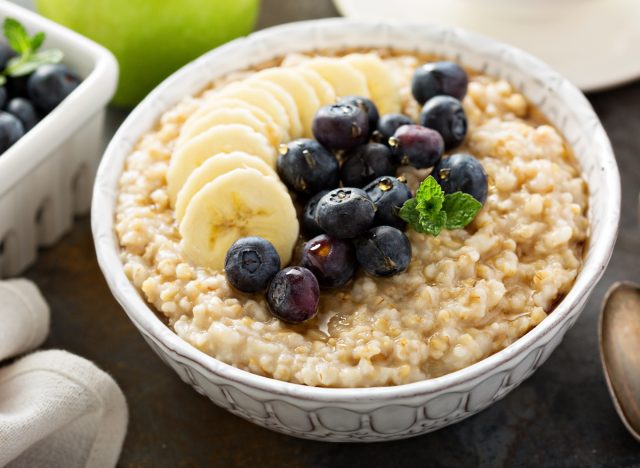
If you like a chewy, nutty cereal, go for steel cut oats, a high fiber whole grain. A meta-analysis of studies in Nutrients showed that type 2 diabetics reduced their fasting blood glucose and HbA1C levels—a measure of blood sugar levels over three months—after eating oatmeal, despite the foods' high concentration of carbohydrate. Other studies show that a soluble fiber called beta glucan in oatmeal improves satiety, which can lead to weight loss.
"Whole foods crowd out less healthy foods," says Shapiro. "We tend to eat less and smaller portions of whole foods like oats than we do processed foods that are created to make us crave more."
Beets
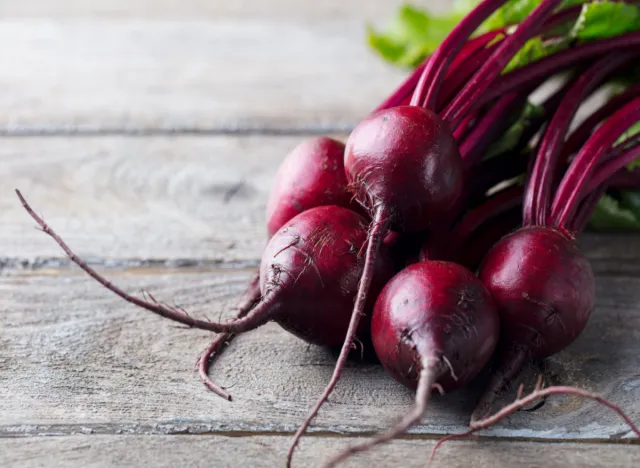
Yes, a serving of beets, which is about a cup, contains 13 grams of sugars, but it won't impact your blood sugar or your weight like the equivalent in rice pudding or cookies. That's because it packs 2.8 grams of dietary fiber, which slows the absorption of the sugars into your bloodstream.
"Even notoriously "starchy" vegetables like beets contain great health benefits," says registered dietitian Lauren Chaffin, MS, RD, and owner of Nourished Nutrition. "Beets contain tons of micronutrients; most notably 20% of our daily folate needs in one serving."
White potatoes
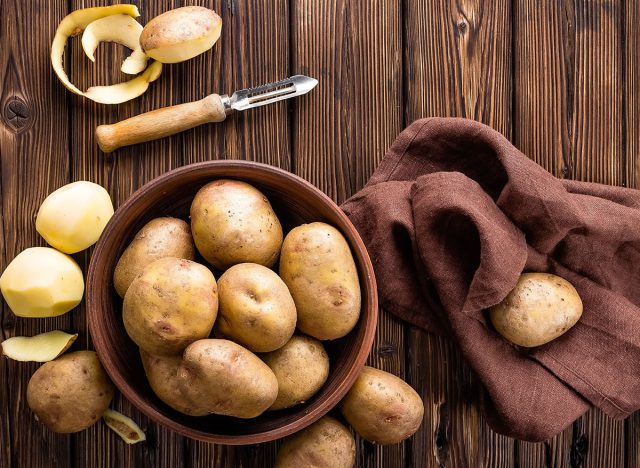
Don't discount this starchy vegetable even though it's probably the food (think French fries) that immediately comes to mind when you think "carbohydrate." There's a cool technique for negating the carbohydrate impact on your blood sugar, so you can eat it without worrying about being hungry in an hour: Chill before you eat. Cooling white potatoes after cooking turns them into a "resistant starch," meaning it resists digestion and does not spike blood sugar. Because their starch is not digested in the small intestine, your gut bacteria process it. That will balance your blood sugar level and support healthy gut flora, both of which promote weight loss.
Sweet potatoes
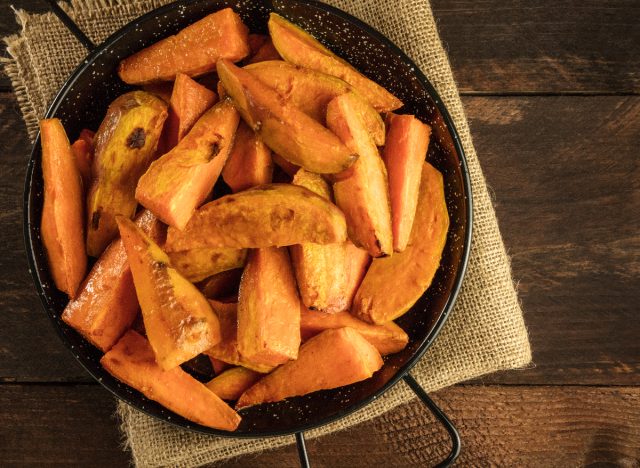
For variety, put the white potato's yellowish orange cousin the sweet potato on your menu. Sweet potatoes are full of the antioxidant beta carotene, which our body converts to vitamin A.
"Just one serving has all the beta carotene we need in a day," says Chaffin. "Both sweet potatoes and russet potatoes are good sources of vitamin C, potassium, and fiber."
Chickpeas & lentils
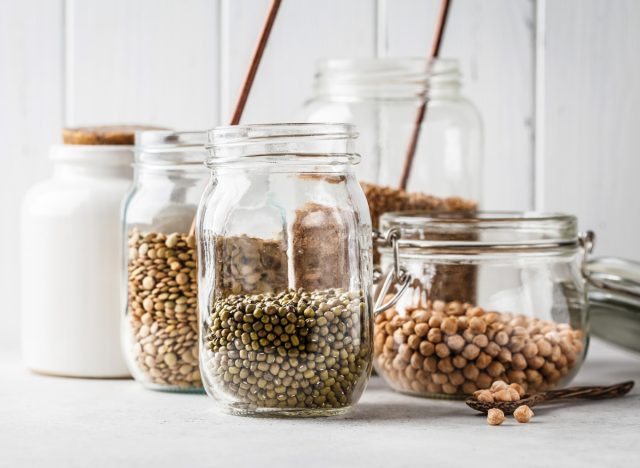
A cup of chickpeas contains about 12 grams of dietary fiber and about 45 grams of carbohydrates, which makes this super high-carb legume just fine for those watching their carbs and weight.
"Legumes like chickpeas and lentils and all types of beans are high-carb food, but preferred carbohydrates because they contain essential vitamins, minerals," says Dr. Escobar.
Bananas
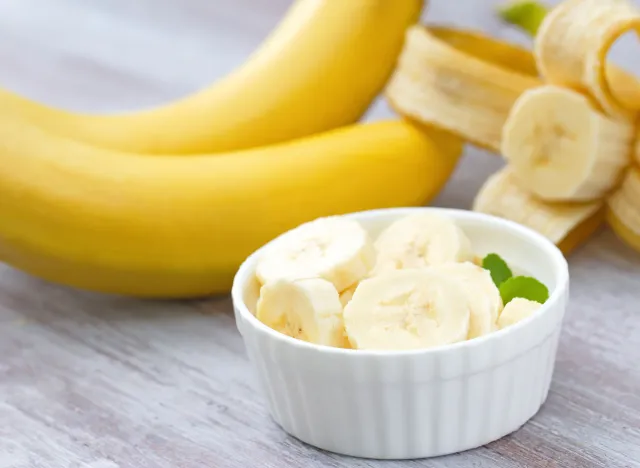
Another high-carb food that you might be surprised to learn won't make you fat is bananas. First, bananas are high in blood pressure-lowering potassium, so a banana a day is a fine way to protect your heart. But if you're concerned about a banana's high sugar content, then eat a green banana. Unripe bananas have less sugar and, like cold potatoes, more resistant starch, which improves the ratio of healthy bacteria to unhealthy microbes in the gut.
Quinoa
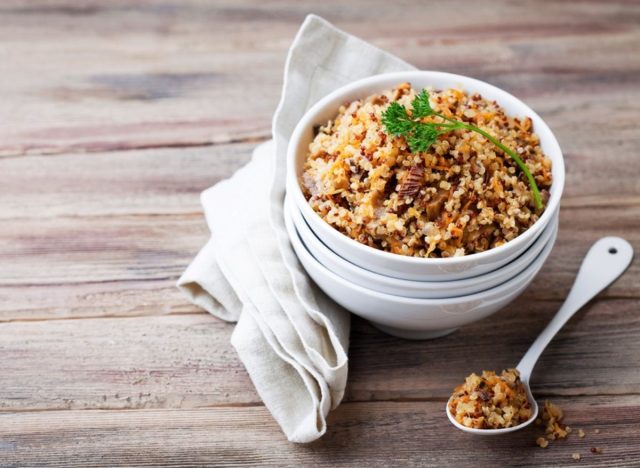
When you feel you need a starch like rice as a side dish, swap in a serving of quinoa. This whole grain has a lot going for it: It's a good source of fiber and protein, both of which will keep your hunger satisfied and slow the absorption of its carbohydrates (sugars) into your bloodstream.
"Refined grains like white rice and other processed grains increase your chances of weight gain and disease," says Amy Goodson, MS, RD, author of The Sports Nutrition Playbook and member of our Medical Expert Board.
By contrast, a fiber-rich whole grain like quinoa takes longer to digest, so it tends to keep us from eating as much to feel full. And that digestion process boosts calorie burn. In one study in The American Journal of Clinical Nutrition, researchers found that subjects who ate whole grain foods for six months burned an extra 100 calories per day due to their increased resting metabolic rate.
Blueberries & raspberries
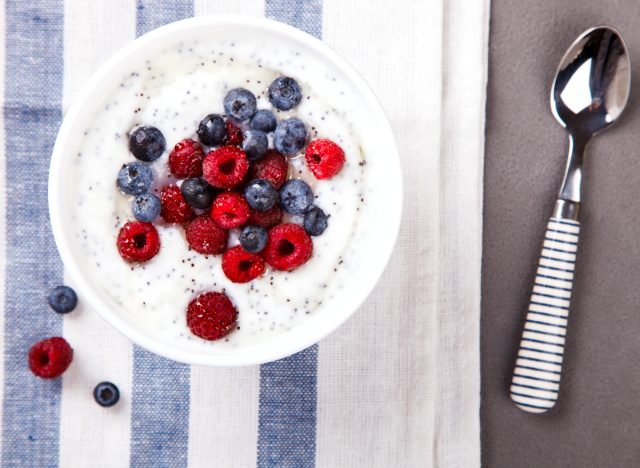
Eating a variety of fruits, though high in carbs, will deliver health benefits that overshadow the calories and sugars you're getting from these whole foods, say dietitians.
"When you mix up the colors, textures, and types of fruit, you are essentially getting a wide mix of vitamins, minerals, and phytochemical, which gives produce its variety of colors," says Chaffin.
Make sure blueberries, raspberries and blackberries are in that mix. "Berries are a good choice to eat regularly," she adds. "They all contain great quantities of fiber and are some of the most nutrient-dense carbohydrates you can eat, with high levels of antioxidants, vitamins, and minerals."
No comments:
Post a Comment